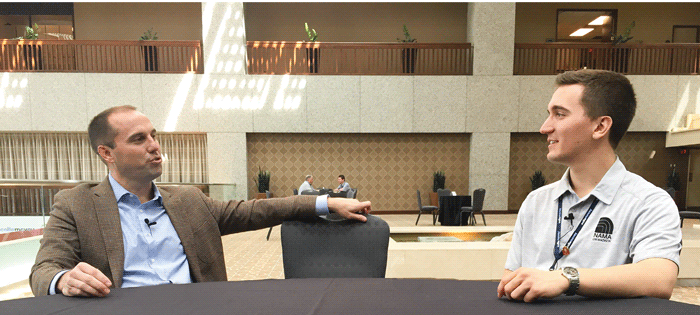Neil Caskey
Osborn Barr Executive Vice President,
St. Louis, Mo.
Jordan Gaal
University of Wisconsin-Madison Graduate, Spring 2018
Pictured Above: Jordan Gaal (right), a life sciences communication and ag marketing major attending the National Agri-Marketing Assn. conference, tells Neil Caskey (left) why intentionally short messages have a lasting effect on Gen Z over conventional tactics when communicating with the next generation in agribusiness.
Neil Caskey: We did the first, and I believe only, survey on Gen Z and agriculture and realized, “Holy crap. Gen Z is actually moving out of college and into the work force.”
Jordan Gaal: One benchmark I’ve seen says Gen Z starts after 1995. That would be my generation then.
Caskey: That’s right. What do we know about them? Not much, outside of them liking technology. One thing in our studies that stood out was a more open attitude toward government compared to Gen X, which consists mostly of their parents. Another standout was brand loyalty declining from folks around your age, relative to their parents.
Gaal: Just based on my own observations and having younger siblings grow up with their own platforms, it seems every Gen Z’er is their own personal brand manager. I think brand loyalty has dipped in-part because since they were 9 years old, they had multiple social media accounts curating an online presence of themselves, giving them the opportunity to self express in a way that not even I could. I grew up with Windows 95 and didn’t have Facebook until I was 16. My parents made my sister wait until 13 to use Facebook, but she was on other social platforms before then. A big part of her online personality, for example, is that she wears Crocs everywhere from prom to Antigua over spring break.
Caskey: She’s true to that brand.
“Just knowing the distrust of government from Millennials, and for all the right reasons, I was expecting a similar response from Gen Z…”
– Neil Caskey
Gaal: Exactly, but that’s not necessarily the “popular” brand right now. I think younger people with their own outlets are expressing themselves and their own brands in ways older generations didn’t. They have a chance to display themselves in more a unique way, if that makes sense.
Caskey: It makes perfect sense. Therefore, they’re more influenced by other people. So, your sister kind of considers herself to be her own brand.
Gaal: It seems so, and her influencers aren’t necessarily celebrities, but her own friends instead, which I find fascinating. There’s only a 4-year gap between us, but it just seems like a world of difference in the way that high schools are currently run. After I graduated, they introduced personal laptops to every student in the high school.
Caskey: Amazing what a difference just 4 years makes. Going back to the study we conducted, what about the government part?
Gaal: That one’s interesting to me, because I know I’ve read a lot about how the Millennial generation has a big distrust in government. Every generation has a defining moment, whether it’s the Great Depression or Vietnam War. I think it will be interesting to see the impact of that on Gen Z’s perception as we go further down the line.
Caskey: Just knowing the trend of distrust from Millennials, and for all the right reasons, I was expecting a similar response from Gen Z.
Gaal: Maybe it’s a level of apathy. I don’t see my younger siblings as into politics as my peers or I. Then again, hopefully we can eventually find more insights into that. From my end, I’ve heard, “Oh, we just need to fall back on government agencies for agriculture too. It’s FDA approved, what’s the problem?” Well, the problem is that Millennials don’t trust the FDA.
Caskey: When looking at ag marketing today and the fact that Millennials — and soon Gen Z — are now managing farming operations, what are we missing? How are we not connecting with them?
“Gen Z has 8 seconds to decide if something’s interesting or not, and if it’s not, we’re done with it…”
– Jordan Gaal
Gaal: One thing I’ve noticed is a lot of messages are produced by older generations attempting to market to younger farm operators, and as a result, the content becomes what those marketers would want to hear as opposed to the preferences of the target audience.
Caskey: Ouch.
Gaal: I’ll be blunt. I think there are a lot of people who do it really well too, but this new generation cares about different things that aren’t always taken into consideration. Gen Z on average has around 8 seconds to decide if something’s interesting or not, and if it’s not, we’re done with it. I’ve never timed myself, but that’s one of the biggest differences between generations. Where there’s a gap in the marketing are those message times. They take too long.
Caskey: You’ll have to forgive me when I say this, but most of us here are still creating for the 8.5 x 11 piece of paper. We can’t deliver that in 8 seconds.
Gaal: I mean, again, I’ve got a lot of 8.5 x 11 pieces of paper in my bag. I’m probably not going to take them home. The things that capture my attention are intentionally brief ads. Geico has an ad that says “Geico Car Insurance: you can’t skip this ad because it’s already over,” then it’s done and the “skip” button pops up. I love that and will remember it.







